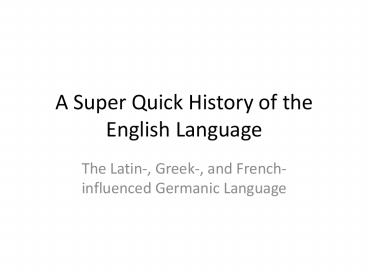A Super Quick History of the English Language - PowerPoint PPT Presentation
1 / 29
Title:
A Super Quick History of the English Language
Description:
http://en.wikipedia.org/wiki/Greek_and_Latin_roots_in_English ... Online Etymology Dictionary. Vocabulary Quizzes of Words from Greek and Latin Roots ... – PowerPoint PPT presentation
Number of Views:1709
Avg rating:3.0/5.0
Title: A Super Quick History of the English Language
1
A Super Quick History of the English Language
- The Latin-, Greek-, and French- influenced
Germanic Language
2
The Beginning The Greeks
- Alexander the Great expanded the Greek Empire
until it covered most of the known world - Greek became the lingua franca of the
Mediterranean region
3
Pre-Roman England
Up until the 1st century AD, Celtic languages
were spoken in the British Isles (no Greek,
yet!)
4
The Romans
- The Roman Empire grew to power as the Greek
Empire declined - Since Greek was an established language in the
region, both Greek and Latin were spoken in the
Empire - Greek learning and government influenced Roman
life
5
The Romans
- In 43 AD, the Romans invaded England
- The Romans continued moving north and conquering
more of the island over the next 40 years.
6
The Romans
- The Roman Empire at its height in 117 AD
7
The Romans
- The influence of Latin at this time can bee seen
in place names ending in chester Manchester
and caster Lancaster - Derivatives of the Latin castra, a military camp.
8
The Anglo-Saxons
- In the fifth and sixth centuries, warrior-farmers
from northwestern Europe invaded England
9
The Anglo-Saxons
- These invaders brought their Germanic languages
with them
10
Latin Again
- In the 6th century, the Anglo-Saxons were
converted to Christianity. - The Roman Catholic church brought Latin back as
the language of the church
11
Old English
12
The Normans
- When Edward, King of England, died without an
heir, William the Conqueror (from Normandy,
France, related by marriage to Edward) invaded
England in 1066 AD - (Battle of Hastings)
13
What language did the Normans speak?
- In the 5th century, the Roman Empire declined.
- The Latin spoken in the Empire degraded into
local dialects (the Romance Languages) - The Normans spoke a variety of Old French
Modern Romance Languages
14
The Normans
- The Anglo-Saxon ruling class was removed and
French became the language of the government,
law, and the church. - They brought Latin back (through the Old French)
into the evolving English language - (Modern English has twice as many words derived
from French or Latin than it does from German)
15
Middle English
16
The formality of French
- Because of the French-speaking monarchy, many
English words derived from French have a more
formal connotation.
17
Evolving Language
- After about 150 years, French lost favor and
English (albeit a much different English from its
Germanic roots) began to be spoken more in formal
settings.
18
The Renaissance
- The Renaissance brought a renewed interest in
classical learning, especially Latin and Greek - Many scientific words are derived from Latin and
Greek - (Also, Greek influenced Latin, so many Greek
roots arrived in English through Latin)
19
Summary
- 60 of English words have Latin roots
- Many specialized words (usually
scientific/medical) have Greek or Latin roots - Learning common Latin and Greek roots may help,
especially with words you have to guess - A Selection of Latin Roots and Greek Roots,
Combining Forms, Words, and Prefixes - Common Prefixes, Suffixes and Roots (for the GRE)
- http//en.wikipedia.org/wiki/Greek_and_Latin_roots
_in_English - http//en.wikipedia.org/wiki/List_of_Latin_words_w
ith_English_derivatives - http//en.wikipedia.org/wiki/List_of_Greek_words_w
ith_English_derivatives - Online Etymology Dictionary
- Vocabulary Quizzes of Words from Greek and Latin
Roots
20
- Give a man a fish and you feed him for a day.
Teach a man to fish and you feed him for a life
time. Chinese proverb
21
Word Study
- circumambulate
22
Word Study
- circumambulate
- v
circum- around Latin circumference,
circumnavigate, circumcise,
23
Word Study
- circumambulate
- v
circum- around Latin circumference,
circumnavigate, circumcise,
ambulare to walk Latin ambulatory, ambulance
walking hospital
24
Word Study
- circumambulate
- walk around something often with ritual meaning
- In Islam, circumambulation is performed around
the Kaaba in Mecca, in a counter-clockwise
direction.
25
Word Study
- circumspect
26
Word Study
- circumspect
- v
circum- around Latin circumference,
circumnavigate, circumcise,
27
Word Study
- circumspect
- v
circum- around Latin circumference,
circumnavigate, circumcise,
specto to observe Latin spectacles, spectacle
something seen, spectator
28
Word Study
- circumspect
- aware of all circumstances heedful of potential
consequences cautious - Being aware of the danger of upsetting her
audience, she was somewhat circumspect in her
comments.
29
- http//quizlet.com/set/8672/






























